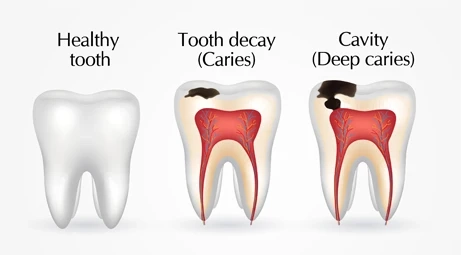Like nature itself, the body is an interconnected system. Thus, problems in one area of the body may cause problems in other areas that at first seem unrelated.
The same can be said for the solutions to these problems as well.
Dental Decay & Its Relation to the Body
Dental decay results from plaque. Plaque is acidic and filled with bacteria. Over time, it will begin to wear away at the various layers of the tooth.
It starts with the enamel, the protective outer layer of the tooth. From there, it begins working on the dentin (once a hole is worn away in the dentin, you officially have a cavity). After that, it begins to attack the tooth pulp. This is the soft inner core of the tooth that contains the tooth nerve and various blood vessels.
At this point, serious infection can occur, including the formation of a dental abscess, which is an inflamed pocket of pus that appears at the gumline.
The bacteria that builds up in your mouth due to dental decay has easy access to the bloodstream. As bacteria festers and the teeth begin to rot, more bacteria can enter your bloodstream, which can then travel to the arteries of your heart and the blood vessels of your brain.
Heart Disease
One of the main factors in heart disease is plaque build up in the arteries. A lot of this comes from food, but plaque from your mouth can also reach these arteries after traveling through your bloodstream.
Another factor in heart disease is inflammation, which is another common result of plaque. The bacteria most commonly found in plaque - Streptococcus mutans - is notorious for causing inflammation.
Stroke
The bacteria found in plaque may make its way into the bloodstream and then into the various blood vessels in the brain, putting one at higher risk for stroke and cerebral microbleeds. In fact, many people who have been diagnosed with hemorrhagic stroke have been found to have higher amounts of Streptococcus mutans in their saliva.
Periodontal (Gum) Disease May Also Cause These Problems
If plaque begins to infect the gumline, the body responds by releasing a hormone that causes the gums to become inflamed. Inflammation is one of the body’s ways of defending itself against infection and damage. However, this chronic inflammation can cause serious problems for your teeth and, eventually, your body.
Symptoms of gum disease include:
● Excessive bleeding, especially when brushing
● Discolored gums (usually bright pink or purple)
● Gum recession
● Halitosis (chronic bad breath)
● Loose or shifting teeth
● Tooth loss
Due to the bacteria and excessive bleeding due to this disease, one may be at risk for all of the problems illustrated above.
See Your Dentist
If you are experiencing any stage of dental decay or gum disease, see your dentist immediately. Solving the problem sooner will be less costly, less painful, and mitigate the possible occurrence of serious health issues like heart attack and stroke.


